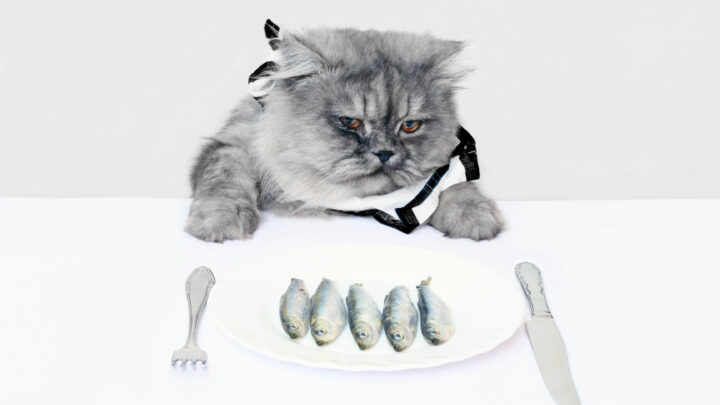We know for a fact that fish is one of the healthiest seafood options available. Humans, like our furry pals, can benefit from eating this meat. Although felines don’t necessarily go fishing, they still love the sea taste it brings. But can cats eat sardines, for example?
These little, thin fish are extremely enticing to your pet. The good news is that they’re not only safe, but they’re also a great way to add variety to your cat’s diet. Be aware, however, that a cat’s stomach is delicate.
Even though she’s an obligate carnivore, you’re wondering if sardines would be a problem for her or a great addition to her diet. Fish can send your feline into a feeding frenzy, so it’s great that your cat isn’t in any danger while feasting on this dish.
We’ll explain the benefits and drawbacks of your cat eating sardines. Let me just state that some of the facts we are about to provide may be baffling.
Can cats eat sardines and just how often?
Cats can eat sardines depending on how they are prepared. These fish can be quite beneficial to your feline. However, the situation might quickly deteriorate. You’re definitely familiar with the phrase “too good to be true”.
Also, we know felines are obligate carnivores meaning they need meat to survive. Fish is a good source of protein, but shouldn’t be the main dish on their menu. So, let’s check if cats eating sardines is good or hazardous.
What’s the good stuff in sardines?
Sardines are an excellent source of nutrition for your cat. They provide vitamins, minerals, and other nutrients to meet a range of dietary requirements. It’s a near-ideal treat for your pet when mixed with other feline-appropriate meals.
When considering if cats can eat sardines, it’s also important to examine the nutritional benefits. Fish isn’t a carnivore’s primary source of nutrition, and it should never be the main course.
However, popular fish such as sardines, mackerel, salmon, and others, are great ingredients that you can add to your cat’s diet.
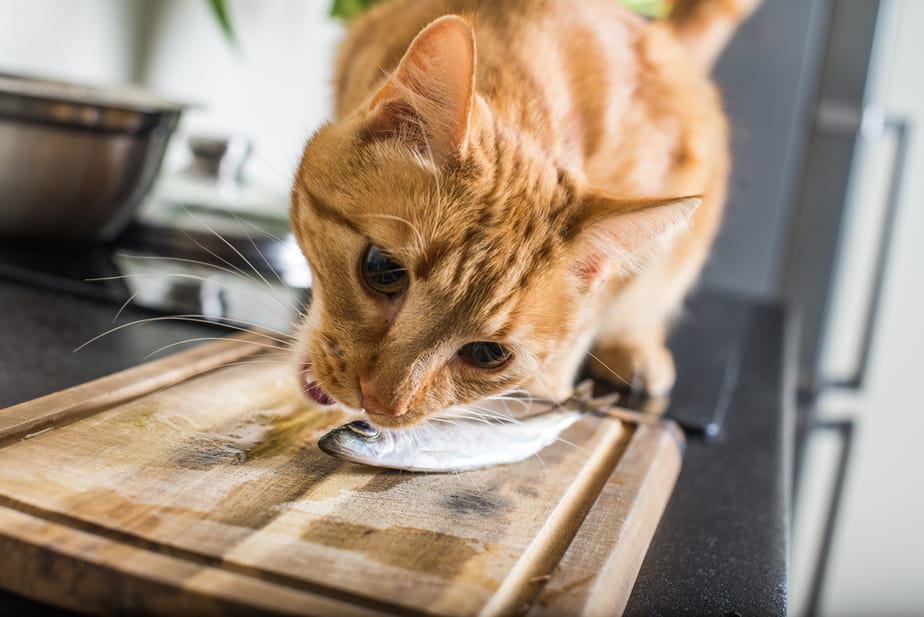
1. A load of vitamins
Vitamins are a must-have in your cat’s diet. They give her the vitality she requires. Lazy cats are boring when compared to lively ones. Every once in a while, we appreciate their sudden bursts of energy, right?
Cats, for example, are unable to get vitamin D from sunshine in the same way that people do. As a result, it’s critical that they get enough of this supplement.
Vitamin D deficiency is linked to a decrease in bone density. So, if you feed your cat some sardines occasionally, you’ll be able to avoid this problem.
Vitamin A is another crucial nutrient. If your cat is missing this vital vitamin, you should have her eyes examined. Night blindness is the most common symptom of vitamin A insufficiency.
You’ll notice that your cat has trouble finding her way around at night. This should not be happening because felines are nocturnal animals by nature.
If this appears to be the case, discuss with your veterinarian the possibility of including sardines and other fish like anchovies in her normal diet. Since cats are inquisitive creatures, poor vision may prove to be harmful.
Vitamin B3, also known as niacin, provides vitality to your cat. This vitamin aids in the conversion of food into energy. This is why your cat doesn’t sleep all day and, more than likely, why she has the energy to go berserk in the early morning hours.
B12 is another vital vitamin in addition to these. Cats, like humans, lack the ability to produce B12 on their own. As a result, their food is the primary supply of this essential vitamin.
Vitamin B12 deficiency can have a detrimental impact on your cat’s health, causing serious problems such as weakness, fatigue, and lightheadedness. This vitamin can aid digestion and maintain a healthy neural system in your pet.
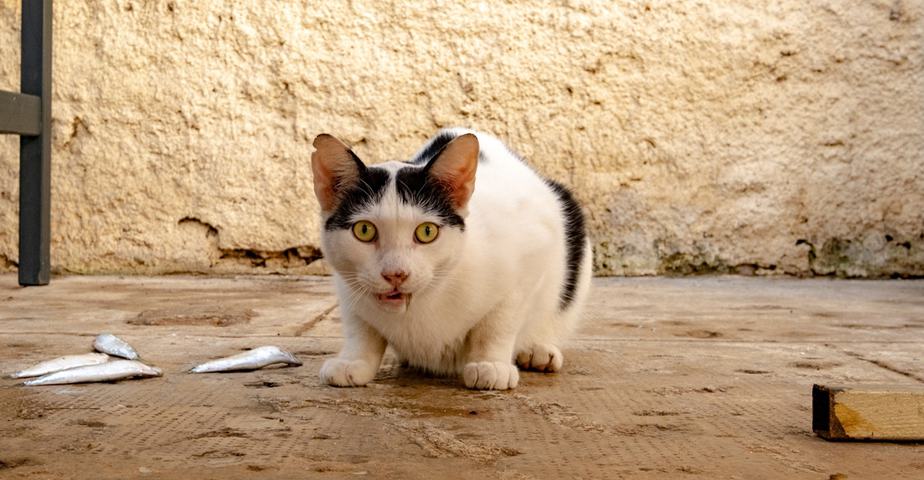
2. Minerals
Besides vitamins, sardines are also packed with minerals. These are necessary if you want your cat to live a long and healthy life.
Calcium, for example, is crucial for maintaining her bone health. Bones, teeth, as well as claws, contain a significant amount of calcium. As a result, calcium is an essential mineral that needs to be supplemented in food.
Sardines, too, are a good source of iron. Iron is required for the formation of hemoglobin, a component of blood cells that carries oxygen through the whole body.
Selenium is a trace mineral that is required for muscular contraction. Selenium and potassium are both beneficial to your cat’s immunological and neurological systems.
Because these tasty fish are high in these vitamins and minerals, cats may safely consume them.
3. A source of omega-3 fatty acids
If these facts aren’t enough here’s something else to urge you to feed your cat sardines. Omega-3 fatty acids, which are abundant in this fish, are an excellent source of energy!
The three primary omega-3 fatty acids are alpha-linolenic acid (ALA), eicosapentaenoic acid (EPA), and docosahexaenoic acid (DHA). These ensure your cat’s health is in tip-top shape. They maintain a healthy heart, lungs, and immune system.
Omega-3 fatty acids are also anti-inflammatory and help to keep your cat’s skin moisturized. If you don’t want to be brushing your cat on a daily basis, try feeding her sardines or tilapia.
This won’t completely prevent your fluffball from shedding, but it will help! It will reduce her shedding and give her coat a lustrous sheen.
If you’re wondering can cats eat sardines due to their fat content, the answer is yes! You should expose your feline friend to omega-3 fatty acids as they will benefit her greatly.
4. Don’t miss the good part – protein!
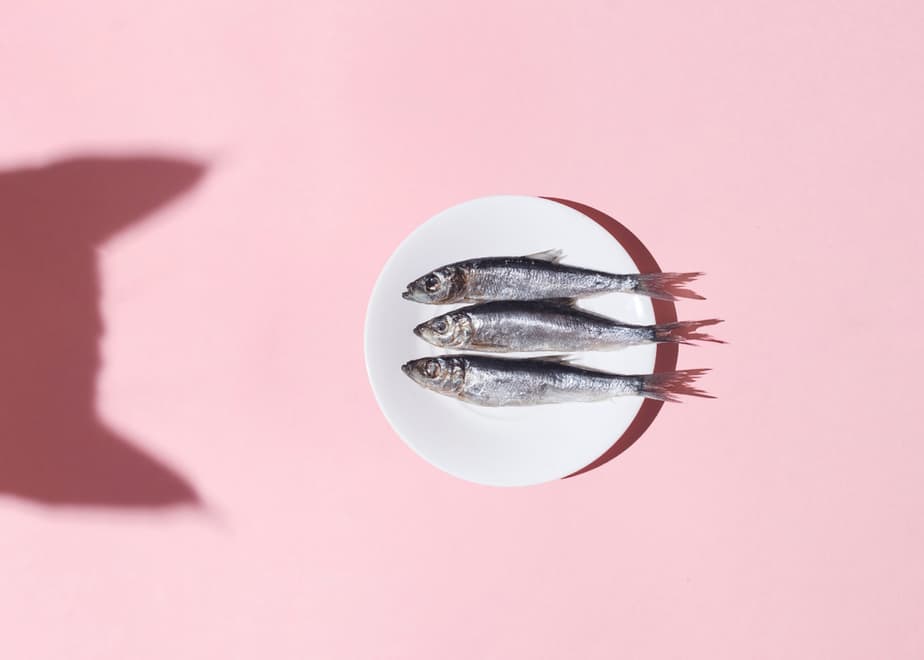
Cats aren’t just a fan of fish, they are crazy about it! There are a few notable outliers, but for the most part, they regard fish as a delicacy. Fresh sardines have a strong odor that may stop you from eating them, but they will surely make your cat drool.
Fish are attractive to cats due to their high protein content. Cats are obligate carnivores, meaning they must eat meat on a regular basis to meet their protein requirements. As a result, cats will not only eat sardines but will also beg for them!
Protein helps carnivores in a number of ways, including improved immunity and a better neurological system. It’s the most crucial component and affects your cat’s overall health.
If your cat doesn’t get enough protein, she will lose weight, muscle mass, and become frail. Even though there are a ton of plant-based proteins such as beans, animal-derived ones are easier for her to digest. Her body is simply built that way.
What can go wrong?
So far, we’ve established that cats can eat sardines. Because of their popularity, these fish come in a variety of shapes and sizes. Raw, dried, or canned are the most popular methods of consumption.
Even with all of the health benefits, feeding sardines to your cat still comes with a risk. Although these little fish are more beneficial to your cat than harmful, you should keep the following in mind.
Fish allergy
Cats, just like people, can be allergic to certain things. Unfortunately, fish isn’t an exception. This allergy can be present at birth or develop over time in cats. Skin rashes and hair loss are two of the most prevalent symptoms of fish/seafood allergy in cats.
If your cat’s behavior changes after eating fish, arrange an appointment with your veterinarian. Your cat may display indications of seafood intolerance in addition to allergies. This may appear to be identical to an allergy, but the symptoms are what distinguish it.
Vomiting and diarrhea are common symptoms. It’s better to let go of the fish if your pet shows any indications of gastrointestinal distress.
Next to fish, your feline may show changes in behavior after eating various seafood, such as lobster and crab meat.
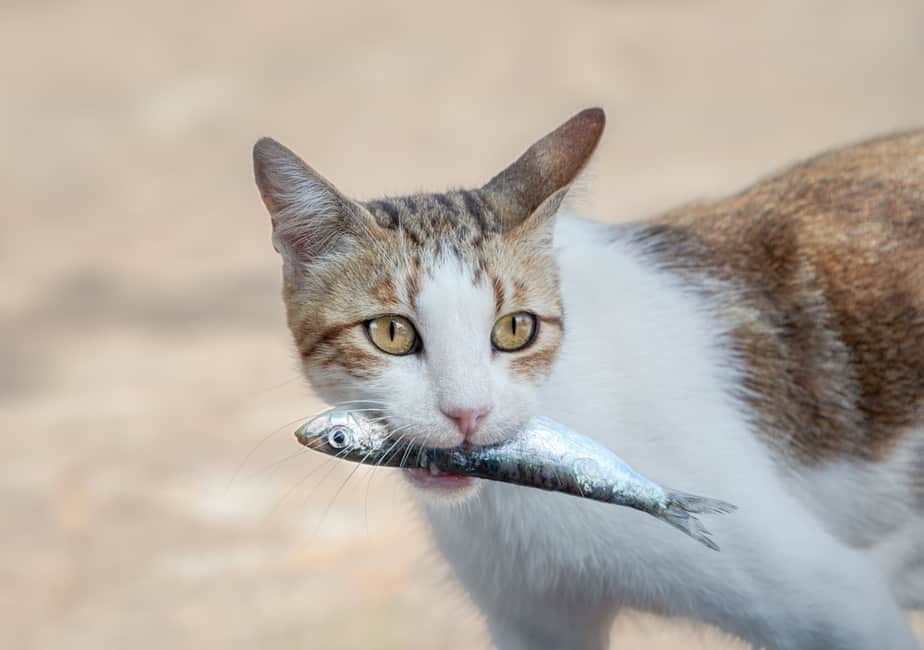
Can cats eat raw sardines?
Anisakis parasites can sometimes be found in these tasty treats. Cooking or freezing will destroy these parasites. So, as long as you don’t give your kitten raw fish you shouldn’t have any problems.
Fish often have significant quantities of mercury in addition to parasites. This hazardous build-up of heavy metals occurs naturally. These might cause your cat to become shaky and dizzy.
Mercury poisoning build-up is more likely to develop in bigger fish such as tuna. It’s a rare occurrence in sardines since they are tiny, skinny fish.
Next to these downsides, raw fish can be a choking hazard. It’s harder to chew and digest and therefore, it can get stuck in your cat’s throat. Besides, their small bones, although edible, can be a disaster waiting to happen.
These small bones have the potential to break in half, cutting your cat’s mouth, gums, and throat. When offering sardines with fish bones to your cat, make sure you’re present to oversee them.
If these bones move deeper down, they can cause even more problems. If your cat swallowed whole fish bones without eating them thoroughly, it could lead to obstructions in their throat or intestines.
Can cats eat cooked sardines?
It’s undoubtedly the finest method to feed your cat sardines! Cooking these fish isn’t our favorite smell out there, but it will for sure thrill your four-legged friend. So just suck it up for your pet’s love!
When making these treats for your cat, remember to leave out the traditional human ingredients. Do not add any butter, oil, salt, or other ingredients. These can make your cat’s stomach upset and some ingredients such as garlic are highly toxic to felines.
Can cats eat sardines in tomato sauce?
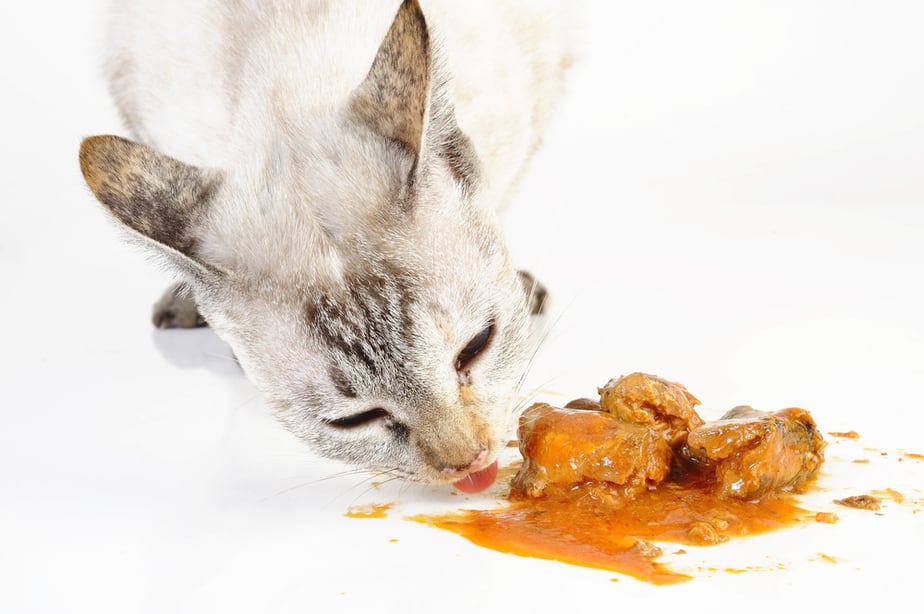
Small amounts of fish in tomato sauce, while not recommended, are unlikely to hurt your cat. Your cat will not be harmed by the taste of sardines in tomato sauce. However, keep in mind that this type of fish prep involves a lot of salt.
Despite the fact that tomato sauce, unlike ketchup, is sometimes produced without many spices, it still includes tomatoes, which are harmful to cats.
And it might be particularly hazardous to your cat if it contains onion, garlic, spices, or herbs. While cats can eat sardines in tomato sauce, this implies small amounts once in a blue moon. Don’t overfeed her even if she enjoys fish in tomato sauce.
Can cats eat sardines in sunflower oil?
Actually yes, cats can eat sardines in sunflower oil. Sunflower oil also aids in the production of energy, the maintenance of a healthy immune system, a healthy heart, and the correct functioning of other organs.
However, sunflower oil shouldn’t be utilized as a source of fatty acids on its own. On the contrary, it’s advised for usage in a home-cooked diet. So, we can conclude that sardines in sunflower oil are safe for felines, just don’t overdo it.
Can cats eat sardines in soybean oil?
Soybeans, often known as soya beans, are a versatile ingredient used in a number of cuisines. One thing that they have a lot of is vegetable protein. However, since your carnivorous pet’s digestive system isn’t designed to process plant material, this might be a problem.
Soybeans aren’t hazardous to your cat in and of themselves, but they won’t assist her much. Soybean oil isn’t toxic to cats, although it isn’t particularly nutritious. As a result, it’s not a component to be concerned about, but it’s also not recommended.
You may mistakenly believe that soybean oil and soy sauce are the same things, but they are not. While soybean oil isn’t hazardous to cats, soy sauce can cause significant harm. Therefore, some soybean oil with sardines isn’t a problem.
The only concern is whether your cat will like it. We know they can be picky sometimes, but maybe the smell of fish will persuade her to dig into this dish.
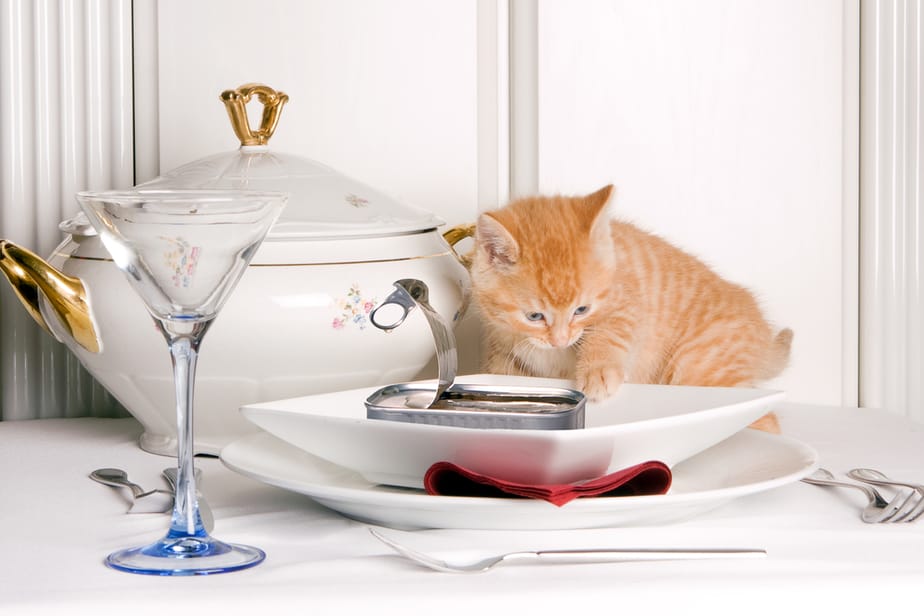
Can cats eat sardines in water?
This question may sound silly, but a careful cat parent is always cautious when it comes to their furbabies. If you’re wondering can cats eat sardines in water, you can calm down. Yes, sardines in water are entirely safe for your pet.
Moreover, they could probably be one of the best options to feed your pet next to plain, cooked sardines. They don’t contain added salt and spices that are harmful to felines. Also, they’re a great source of hydration and we know how cats can be when it comes to drinking water.
Therefore, not only are they safe, but they will keep your furkid hydrated and with a full tummy!
What about canned and dried sardines?
Canned sardines are OK for your cat to consume, but fresh or dried sardines are preferred. Canned ones are also wonderful, although they may contain too much oil and salt.
These two components should persuade you to reconsider your decision. If at all feasible, choose fresh sardines for peace of mind.
When it comes to dried sardines, these can serve as an awesome cat treat! This kind of fish is completely safe for your pet. Furthermore, the nutritious content of dried sardines isn’t depleted throughout the drying process.
Since sardines are very pungent, it’s more convenient to purchase them dried rather than fresh. It’s easier for you to feed your kitty this form because the fishy scent gets almost eliminated in the drying process.
However, while sardines are a healthy choice for your cat, avoid the salty varieties. Your cat’s supper will most likely be ruined due to the excessive salt. Sodium isn’t recommended for your four-legged friend because it might create health problems.
In conclusion
To summarize, cats can eat sardines. They’re a high-protein food that cats can’t live without. This benefits their overall health, muscle mass, and serves as the main source of energy. These tasty snacks are also high in vitamins and minerals, which are important in your cat’s diet.
On the other hand, this fish is only safe for cats if it’s properly cooked. While cats can eat raw seafood, doing so will not do them any favors. Certain germs and bacteria may be present in raw sardines.
Varieties of sardines are okay for felines to eat unless they’re packed with salt and other spices. Be sure to watch out for the tiny bones that are a choking hazard.

